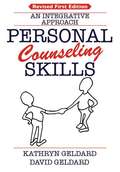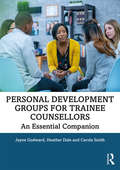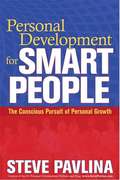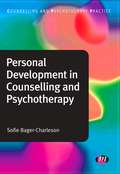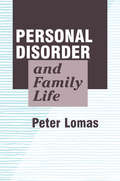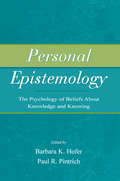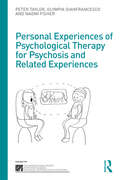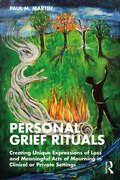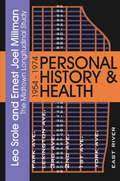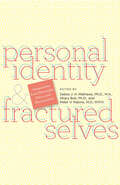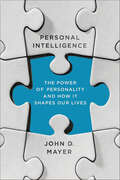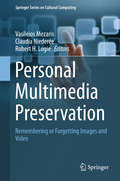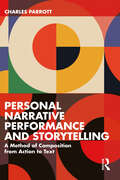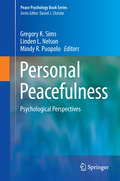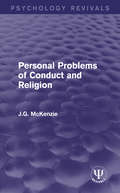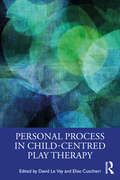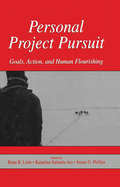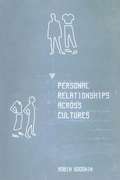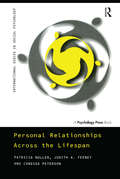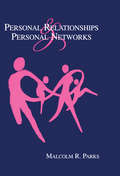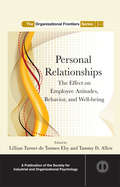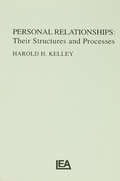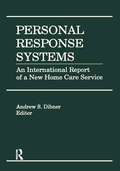- Table View
- List View
Personal Counseling Skills: An Integrative Approach
by Kathryn Geldard David GeldardThis book is a comprehensive, easy-to-read introduction to personal counseling written for professional and volunteer counselors and those who train them. It is also a valuable resource for workers in a wide variety of helping professions where counseling skills are useful such as in psychology, social work, welfare work, medicine, nursing, education, and human services.
Personal Development Groups for Trainee Counsellors: An Essential Companion
by Carole Smith Jayne Godward Heather DalePersonal development (PD) groups are a key feature of many counsellor training programmes. Personal Development Groups for Trainee Counsellors: An Essential Companion is a comprehensive and accessible study guide written by experienced tutors and lecturers to support students with their PD group work and other personal development activities, helping students to get the most out of these experiences. This essential resource is aimed primarily at those who are new to counsellor training. It will also be useful for anyone who wants to understand more about the nature of PD groups and how these can be used effectively. Case studies, questions and activities encourage readers to reflect on different topics and on themselves, including looking at how to improve self-care and how mindfulness can help. The book looks at the historical background to PD groups; how they can be used effectively, and also real-life experiences from both tutors and recent students. Other chapters invite the reader to develop their self-awareness through gaining an understanding of how ethics, relationships and identity are developed. There is a discussion about the merits or otherwise of mandatory personal therapy for trainees and also a discussion about the use of supervision. Finally, other important aspects of personal development are discussed including personal therapy, supervision, self-care and mindfulness. Personal Development Groups for Trainee Counsellors will be of use to counsellor trainees on undergraduate and postgraduate diplomas to introduce them to PD groups and other essential activities. It will also be highly informative to those who are on counselling certificate courses to introduce them to aspects of personal development, as well as for tutors to support them in their work as PD group facilitators.
Personal Development for Smart People: The Conscious Pursuit of Personal Growth
by Steve PavlinaThis book contains two parts in which Part I explains Fundamental Principles of Truth, Love, Power, Oneness, Authority, Courage, and Intelligence and Part II explains Practical Application of Habits, Career, Money, Health, Relationships and Spirituality.
Personal Development in Counselling and Psychotherapy (Counselling and Psychotherapy Practice Series)
by Sofie Bager-CharlesonThere is an increased emphasis on self awareness and self care in counselling and psychotherapy training, with a focus on how the therapist as a person affects the therapeutic outcome. This timely book responds to these complex issues and is designed to help counselling students, trainees and graduates with integrating their personal development into their professional planning. There are chapters on bringing the Self into therapy, choosing the right training and how to succeed as an accredited practitioner. Activities and research summaries throughout give this book a fully-integrated approach ideal for busy students.
Personal Disorder and Family Life
by Peter LomasThis work looks into how, why, and when people pursue things in life that they desire, those that make their existence attractive and worth living. Robert A. Stebbins calls this "Positive Sociology," the study of what people do to organize their lives such that they become substantially rewarding, satisfying, and fulfilling. Western society has many challenges: crime, drug addiction, urban pollution, daily stress, domestic violence, and overpopulation. Significant levels of success in avoiding these problems brings a noticeable measure of tranquility, but it does not necessarily generate a positive life.Personal Decisions in the Public Square draws upon, in large part, the sociology of leisure, a "happy science." Among the basic concepts in the sociology of leisure are activity and human agency. The centrality of positive activity is one of its hallmarks and separates it from other social science specialties. Stebbins's positive sociology centers on conceptual roots found in the "serious leisure" perspective. This theoretical framework synthesizes three main forms of leisure (serious, casual, and project-based) while showing their distinctive features, similarities, and interrelationships. Positive sociology also considers two other domains of life: work and non-work obligations.This new approach focuses on the pursuit of "that which makes life worth living." Stebbins explores goals that are important to all people, such as negotiating the right work/family or obligation/leisure balance and the tricky relationship between money and happiness. Research scientists or the general public may find the ideas presented in this volume help them better understand and negotiate situations, by showing how to approach them in a positive way rather than as "problems" that need to be solved.
Personal Epistemology: The Psychology of Beliefs About Knowledge and Knowing
by Barbara K. Hofer Paul R. PintrichThis is the first book to provide a comprehensive overview of the theoretical and methodological approaches to the study of personal epistemology from a psychological and educational perspective. Both theory building and empirical research have grown dramatically in the past decade but, until now, this work has not been pulled together in a single volume. That is the mission of this volume whose state-of-the-art theory and research are likely to define the field for the next 20 years. Key features of this important new book include: *Pioneering Contributors--The book provides current perspectives of each of the major theoreticians and researchers who pioneered this growing field, as well as contributions from new researchers. *Diverse Perspectives--The contributors represent a variety of perspectives, including education, educational psychology, developmental psychology, higher education, and science and mathematics education. *Editorial Integration--Opening and closing chapters by the editors set out key issues confronting the field.
Personal Experiences of Psychological Therapy for Psychosis and Related Experiences (The International Society for Psychological and Social Approaches to Psychosis Book Series)
by Peter Taylor Olympia Gianfrancesco Naomi FisherFor those struggling with experiences of psychosis, therapy can be beneficial and even life changing. However, there is no single type of therapy, and a great range and diversity of therapeutic approaches have been developed to help different individuals’ needs, which makes deciding which approach is most helpful for an individual not a straightforward choice. Personal Experiences of Psychological Therapy for Psychosis and Related Experiences uniquely presents personal accounts of those who have received therapy for psychosis alongside professional clinical commentary on these therapies, giving multiple perspectives on what they involve and how they work. Presented in a clear and accessible way, each chapter includes accounts of a variety of different therapies, including cognitive behavioural therapy, trauma-focused therapy, open dialogue, and systemic family therapy. The reader is encouraged to explore not only the clinical basis for these therapies but also understand what the treatments mean for the person experiencing them, as well as their challenges and limitations. The book also explores the importance of the individual’s relationship with the therapist. As a whole, the perspectives presented here provide unique insight into a range of widely used psychological therapies for psychosis. With its special combination of personal experiences and concise introductions to different therapies, this book offers a valuable resource for academics and students of psychiatry, clinical psychology, psychotherapy, mental health care and mental health nursing. It will also be essential reading for those considering treatment, their friends and families, as well as mental health professionals, including psychiatrists, clinical psychologists, psychotherapists and nurses.
Personal Grief Rituals: Creating Unique Expressions of Loss and Meaningful Acts of Mourning in Clinical or Private Settings
by Paul M. MartinPersonal Grief Rituals presents a new model for how bereaved individuals can create unique expressions of mourning that are tailored to their psychological needs and grounded in memories and emotions specific to the relationship they lost. This book examines cultures across the world and throughout history to shed light on how humanity has always turned to grief rituals and how custom can stifle one’s pursuit of healthy and meaningful mourning. Contemporary psychological research, most notably attachment theory, provides an in-depth understanding of how each individual’s subjective experience of loss varies and why complicated bereavement may emerge. Richly detailed psychotherapy case studies exemplify innovative strategies for designing personal grief rituals. Where one person may visit an old haunt to express sorrow, another might use symbols to strengthen their connection to the deceased, and still another could cast aside vestiges of the past. Personal Grief Rituals is an excellent resource for professionals, students studying the psychology of loss, or anyone hoping to carve a new path through their own grief and mourning.
Personal History and Health
by Leo SroleScientists, philosophers, and storytellers often question why human beings appear to remain constant while existing in a state of change at the same tune. Among those who explore and expose dramatic conflicts between human stability and flux, the number of behavioral scientists has remained relatively low - that is, until Leo Srole followed the progress of a large cohort of people in his Midtown Longitudinal Study. This statistical project was designed to analyze mental health and assess human biological, social, and psychological change. New York's Upper East Side was the study's focus, a sociologically insular community, consisting of loosely differentiated neighborhoods, with a population of generalizable significance that transcended individual characteristics. Midtowners, studied hi 1954 then reinterviewed in 1974, were the subjects of analysis. After a twenty-year hiatus, Srole's eagerly awaited findings and outcomes are available.Personal History and Health by Ernest Joel Millman is a posthumous synthesis of Leo Srole's seminal behavioral study. This book presents the principal findings of MLS - with emphasis on adult mental health predictors, not cause-and-effect relationships. Srole used such biophysical correlates as gender and generation, mental health and history of somatic disorders, and the statistical methods of multiple correlation and regression analysis to predict average mental health. Through this work, Srole's pioneering exploration of social age and adult mental health - in particular how they differed for the women and men of the Midtown Longitudinal Study - has been completed. Personal History and Health is the conclusive, long-range view of those changes.These are Srole's final perspectives on mental health. As was characteristic of him, it is not exploratory or confirmatory, nor does it declare conclusions; rather, it raises questions. Millman offers an accessible yet sophisticated presentation of sociomedical sampling and analysis in language which may be understood by statistically unsophisticated readers, placing all of the explanations, details, figures, and tables in comprehensive statistical appendices. This book will appeal to those in the mental health field, sociomedical scientists, and those with interest in the socioeconomic correlates of health status and/or social mobility in urban society.
Personal Identity & Fractured Selves: Perspectives from Philosophy, Ethics, and Neuroscience
by Debra J. H. Mathews, Hilary Bok, and Peter V. RabinsIn this anthology, noted neurologists and philosophers explore the concept of personal identity and the ethics of treating brain disease and injury.When an individual’s personality changes radically because of disease or injury, should this changed individual be treated as the same person? Personal Identity and Fractured Selves explores this important question from a variety of perspectives. Its contents represent the first formal collaboration between the Brain Sciences Institute and the Berman Institute of Bioethics, both at the Johns Hopkins University.Rapid advances in brain science are expanding knowledge of human memory, emotion, and cognition and pointing the way toward new approaches for the prevention and treatment of devastating illnesses and disabilities. Through case studies of Alzheimer disease, frontotemporal dementia, deep brain stimulation, and steroid psychosis, the contributors highlight relevant ethical and social concerns that clinicians, researchers, and ethicists are likely to encounter.Contributors: Samuel Barondes, M.D., University of California, San Francisco; David M. Blass, M.D., Johns Hopkins University School of Medicine; Patrick Duggan, A.B., Johns Hopkins Berman Institute of Bioethics; Ruth R. Faden, Ph.D., M.P.H., Johns Hopkins Berman Institute of Bioethics; Michael S. Gazzaniga, Ph.D., University of California, Santa Barbara; Guy M. McKhann, M.D., Johns Hopkins University School of Medicine; John Perry, Ph.D., Stanford University; Carol Rovane, Ph.D., Columbia University; Alan Regenberg, M.Be., Johns Hopkins Berman Institute of Bioethics; Marya Schechtman, Ph.D., University of Illinois at Chicago; Maura Tumulty, Ph.D., Colgate University
Personal Identity and Fractured Selves: Perspectives from Philosophy, Ethics, and Neuroscience
by Debra J. H. Mathews, Hilary Bok, and Peter V. RabinsThis book brings together some of the best minds in neurology and philosophy to discuss the concept of personal identity and the moral dimensions of treating brain disease and injury. The contributors engage a crucial question: When an individual’s personality changes radically because of disease or injury, should this changed individual be treated as the same person?Rapid advances in brain science are expanding knowledge of human memory, emotion, and cognition and pointing the way toward new approaches for the prevention and treatment of devastating illnesses and disabilities. Through case studies of Alzheimer disease, frontotemporal dementia, deep brain stimulation, and steroid psychosis, the contributors highlight relevant ethical and social concerns that clinicians, researchers, and ethicists are likely to encounter. Personal Identity and Fractured Selves represents the first formal collaboration between the Brain Sciences Institute and the Berman Institute of Bioethics, both at the Johns Hopkins University. The book asks neuroscientists and philosophers to address important questions on the topic of personal identity in an effort to engage both fields in fruitful conversation. Contributors: Samuel Barondes, M.D., University of California, San Francisco; David M. Blass, M.D., Johns Hopkins University School of Medicine; Patrick Duggan, A.B., Johns Hopkins Berman Institute of Bioethics; Ruth R. Faden, Ph.D., M.P.H., Johns Hopkins Berman Institute of Bioethics; Michael S. Gazzaniga, Ph.D., University of California, Santa Barbara; Guy M. McKhann, M.D., Johns Hopkins University School of Medicine; John Perry, Ph.D., Stanford University; Carol Rovane, Ph.D., Columbia University; Alan Regenberg, M.Be., Johns Hopkins Berman Institute of Bioethics; Marya Schechtman, Ph.D., University of Illinois at Chicago; Maura Tumulty, Ph.D., Colgate University
Personal Identity:
by Georg Gasser Matthias StefanWe take it for granted that a person persists over time: when we make plans, we assume that we will carry them out; when we punish someone for a crime, we assume that she is the same person as the one who committed it. Metaphysical questions underlying these assumptions point towards an area of deep existential and philosophical interest. In this volume, leading metaphysicians discuss key questions about personal identity, including 'What are we?', 'How do we persist?', and 'Which conditions guarantee our identity over time?' They discuss whether personal identity is 'complex', whereby it is analyzable in terms of simpler relations such as physical or psychological features, or whether it is 'simple', namely something that cannot be analyzed in terms of more fundamental relations. Their essays offer an innovative discussion of this topic and will be of interest to a wide readership in metaphysics.
Personal Intelligence: The Power of Personality and How It Shapes Our Lives
by John D. MayerJohn D. Mayer, the renowned psychologist who co-developed the groundbreaking theory of emotional intelligence, now draws on decades of cognitive psychology research to introduce another paradigm-shifting idea: that in order to become our best selves, we use an even broader intelligence—which he calls personal intelligence—to understand our own personality and the personalities of the people around us. In Personal Intelligence, Mayer explains that we are naturally curious about the motivations and inner worlds of the people we interact with every day. Some of us are talented at perceiving what makes our friends, family, and coworkers tick. Some of us are less so. Mayer reveals why, and shows how the most gifted "readers" among us have developed "high personal intelligence." Mayer's theory of personal intelligence brings together a diverse set of findings—previously regarded as unrelated—that show how much variety there is in our ability to read other people's faces; to accurately weigh the choices we are presented with in relationships, work, and family life; and to judge whether our personal life goals conflict or go together well. He persuasively argues that our capacity to problem-solve in these varied areas forms a unitary skill. Illustrating his points with examples drawn from the lives of successful college athletes, police detectives, and musicians, Mayer shows how people who are high in personal intelligence (open to their inner experiences, inquisitive about people, and willing to change themselves) are able to anticipate their own desires and actions, predict the behavior of others, and—using such knowledge—motivate themselves over the long term and make better life decisions. And in outlining the many ways we can benefit from nurturing these skills, Mayer puts forward an essential message about selfhood, sociability, and contentment. Personal Intelligence is an indispensable book for anyone who wants to better comprehend how we make sense of our world.
Personal Multimedia Preservation
by Vasileios Mezaris Claudia Niederée Robert H. LogieThis unique text/reference advocates a novel forgetful approach to dealing with personal multimedia content in the long run, which is inspired by the effectiveness of human forgetting as a mechanism for helping us to stay focused on important things. The text presents theoretical foundations, technologies, applications, and case study results that help the reader to understand the problems and challenges associated with personal digital preservation, and the solutions that can be developed in response to these challenges.Topics and features: Highlights the value of an intelligent and selective approach to personal multimedia preservation, involving managed forgetting and contextualized remembering; considers how a conceptual understanding of human memory function can be used to inspire the design of digital managed preservation and forgetting; discusses methods that endow computers with capabilities to understand digital content, in order to support intelligent preservation decisions; examines the assessment of the importance of information items, introducing the concepts of memory buoyancy and preservation value; reviews methods for preserving the context associated with a digital item, and for assessing how this context evolves over time; proposes a reference model for the Preserve-or-Forget (PoF) approach which is integrative, value-driven, brain-inspired, forgetful, and evolution-aware; describes the integration of preservation functionalities in a Personal Information Management (PIM) application; presents a user study on a photo selection task, using the results to design methods for automatically selecting important photos from personal collections.This interdisciplinary volume provides significant insights from computer science, engineering and psychology that will be of great interest to researchers involved in multimedia and software engineering, multimedia preservation, cultural informatics, digital heritage, and the digital humanities.
Personal Narrative Performance and Storytelling: A Method of Composition from Action to Text
by Charles ParrottPersonal Narrative Performance and Storytelling: A Method of Composition from Action to Text offers a practical method for composing and performing personal narrative stories for artistic and academic purposes. It is designed to make storytelling accessible to seasoned performers and people who are engaging with the artform for the first time. The author’s unique method of composing stories from action to text privileges oral composition over writing. It draws on anecdotes from the author’s many years of coaching storytellers to illustrate concepts throughout the book, making it entertaining and user-friendly. The methods contained in this book can help students and scholars communicate theoretical and scholarly arguments about culture, gender, race, and the environment. Anyone looking to harness the power of personal storytelling to speak about the political and the personal—in a classroom or on a stage—will find Personal Narrative Performance and Storytelling: A Method of Composition from Action to Text of great use. Additionally, the book will be of interest to qualitative researchers and those applying autoethnographic and storytelling methods in communication studies and other related social science and arts disciplines.
Personal Peacefulness
by Gregory K. Sims Linden L. Nelson Mindy R. PuopoloPersonal Peacefulness examines the existing theories and knowledge about the peacefulness of individuals, including inner peace, interpersonal peacefulness, and peaceful attitudes towards groups and nations. It uses the term "personal peacefulness" to refer to the peaceful states, attitudes, and behaviors of individuals, and it discusses the phenomena and determinants of personal peacefulness in the intrapersonal, interpersonal, and intergroup domains. Also addressed is the relationship between personal peacefulness and well-being, describing various methods for enhancing the peacefulness of individuals. Within the framework of a scholarly and scientific approach to the study of personal peacefulness, various psychological perspectives are represented: personality, social, clinical, and positive psychology perspectives, peacefulness as nonviolence, attachment theory and the development of affect regulation, a human needs theory approach, Buddhist conceptions of compassion and mindfulness, a natural science perspective describing physiological foundations for personal peacefulness, phenomenological perspectives, and peacefulness as the promotion of conflict resolution. The book is an important resource for scholars, researchers, and educators in psychology, political science and in a variety of other areas who study and teach topics such as empathy, prosocial behavior, personality, psychological well-being, mental health, personal development, peace and conflict and conflict resolution.
Personal Problems of Conduct and Religion (Psychology Revivals)
by J.G. McKenzieOriginally published in 1932, Professor McKenzie, author of ‘Souls in the Making’, had been deeply interested for years in helping those afflicted with nervous troubles, moral conflicts, or religious doubts. Each chapter of this book deals with some concrete problem which he had actually faced with one of his patients. He was convinced that many of the severer forms of neuroticism could be prevented if treated with understanding, and that many a parent could have been saved from making a fatal mistake in coping with a ‘difficult’ child, if they had only been taught to deal with such. The practical character of this book can best be judged by a glance at a few of the topics discussed: ‘An Adolescent Problem’, ‘The Problem of Growing Up’, ‘The Troubles of Old Age’, ‘Psychology of Sleeplessness’, ‘The Delinquent Child’, ‘Our Regrets and Our Fears’, ‘Psychology of Faith’.
Personal Process in Child-Centred Play Therapy
by David Le Vay Elise CuschieriPersonal Process in Child-Centred Play Therapy provides a very specific exploration of the play therapy process from the personal perspective of the play therapist. This volume examines the personal challenges, opportunities, losses and gains, and numerous obstacles that one has to negotiate through the course of both training to become a play therapist and working as a qualified clinician with children who have complex life difficulties. The book aims to offer a forum within which the role, function and process of the "personal" within play therapy can be explored. Bringing together a number of experienced play therapists, the book shares often deeply personal accounts of their experience of training and clinical practice. Chapters challenge the unspoken therapist taboos of shame, childhood trauma, vulnerability and grief, shining a light on the more hidden areas of therapist experience. Clinical issues around the unconscious process are also explored, but once again from the personal position of the play therapist, rather than the child. With a unique and distinct perspective on the therapeutic process, this book is specifically intended for both trainee and experienced play therapists, but will be relevant to all psychotherapists involved in working therapeutically with children and young people.
Personal Project Pursuit: Goals, Action, and Human Flourishing
by Brian R. Little Susan D. Phillips Katariina Salmela-AroPersonal Project Pursuit is the first book to feature Brian Little's highly respected personal projects analysis (PPA), one of the pioneering theories in contemporary personality and motivational psychology. The book examines both the internal and external dynamics of personal goals and projects and clearly demonstrates that human flourishing is enhanced when individuals are engaged in the pursuit of personal projects. The book opens with the theory and methodologies of personal projects research. The historical perspective on the development of the two dominant research perspectives from personality and developmental psychology is explored. Section II examines the internal dynamics and competing demands of goal formulation and project inception. The third part accentuates the role that social ecologies play in shaping the nature and outcomes of personal projects. These chapters highlight the importance of interpersonal relationships, organizational contexts, and the societal and cultural expectations in affecting the pursuit of personal projects. Ideas for orchestrating the environment to enhance human flourishing are explored. Section IV demonstrates how personal projects can illuminate and enhance human flourishing, from psychological well being to physical health. The book concludes with applications for enhancing human flourishing from individual counseling to public policy. Personal Project Pursuit is intended for advanced students, researchers, and practitioners in personality, social, developmental, industrial/organizational, health, environmental, clinical and counseling psychology interested in motivation and well being. An excellent supplemental text for courses on personality, motivation, positive psychology, well being, personal and life span development, the book's applied focus will appeal to counselors and rehabilitation/occupational therapists.
Personal Relationships Across Cultures
by Robin GoodwinIs falling in love the same the world over? What makes a 'happy marriage' in different cultures? How does our society influence us in the way we raise our children? Is modern life incompatible with intimacy? In this innovative new text, Robin Goodwin challenges many of the established views on relationships by considering how different cultures view different relationships (love, marriage, friendship, the family, sexual relations). By discussing fundamental differences in values between cultures, alongside other key influences such as social class and education, he explores why these differences occur, and how different political and historical events have challenged existing patterns of relationships. Finally, drawing on research from all parts of the world, he considers how we can use this knowledge to help different communities across the globe cope with their most pressing relational challenges. Dr Robin Goodwin is Reader in Psychology in the Department of Human Sciences at Brunel University, London. He publishes widely on relationships and culture, and lectures about his work across the world.
Personal Relationships Across the Lifespan (International Series in Social Psychology)
by Patricia Noller Judith Feeney Candida PetersonPersonal Relationships Across the Lifespan presents a comprehensive and up-to-date account of the role of personal relationships in people's lives.Highlighting areas of special significance and research interest at each major life-stage, Patricia Noller, Judith A. Feeney and Candida Peterson, examine how close relationships develop over time and influence individual adjustment. They explore a wide range of relationships, including some that are often neglected, such as those with siblings, adult children and elderly parents. They also look at alternative family forms, such as single-parent families and step-families, and address important themes such as intimacy, conflict and power.With insightful discussion of the theory and methods typically used by researchers working in this area, Personal Relationships Across the Lifespan is an ideal resource for students and researchers of both relationships and lifespan development. It will also be of interest to practitioners, such as social workers and family therapists, working with clients with relational concerns and anyone wanting to learn more about the nature of relationships.
Personal Relationships and Personal Networks (LEA's Series on Personal Relationships)
by Malcolm R. ParksThe effort to understand personal relationships has traditionally focused on the individual characteristics of participants. Personal Relationships and Personal Networks takes this analysis a step further, focusing on research linking participants' feelings and actions within a given personal relationship to the larger social context surrounding it. Author Malcolm R. Parks expands on the idea that the initiation, development, maintenance, and dissolution of relationships are inextricably connected to each participant's social network-a perspective that allows for a better appreciation of our connection to the world, and a greater understanding our significant power as social actors. This book offers a new way to consider basic notions about how relationships form, such as how particular people meet, and how relationships are started. Among many findings, the volume demonstrates that individuals in relationships feel closer and generally more connected when they also have a greater amount of contact with the members of each other's personal networks and when they believe that network members support their relationship. Additional topics discussed include how this social context model is applicable to different types of relationships; how participants interact with network members; how social networks are involved in the deterioration of personal relationships; and what drives change in relationships. Students, researchers, and professionals in a wide variety of disciplines such as communication, psychology, sociology, anthropology, family studies, clinical psychology, public health nursing, education, and social work will find this book useful, as will anyone seeking to better understand their own personal relationships.
Personal Relationships: The Effect on Employee Attitudes, Behavior, and Well-being (SIOP Organizational Frontiers Series)
by Tammy D. Allen Lillian Turner de Tormes EbyWe know that positive, fulfilling and satisfying relationships are strong predictors of life satisfaction, psychological health, and physical well-being. This edited volume uses research and theory on the need to belong as a foundation to explore various types of relationships, with an emphasis on the influence of these relationships on employee attitudes, behaviors and well-being. The book considers a wide range of relationships that may affect work attitudes, specifically, supervisory, co-worker, team, customer and non-work relationships. The study of relationships spans many sub-areas within I/O Psychology and Social Psychology, including leadership, supervision, mentoring, work-related social support, work teams, bullying/interpersonal deviance and the work/non work interface.
Personal Relationships: Their Structures and Processes (Distinguished Lecture Series)
by Harold H. KelleyFirst published in 1982. Routledge is an imprint of Taylor & Francis, an informa company.
Personal Response Systems: An International Report of a New Home Care Service
by Andrew S DibnerThis important new book describes the origins, developments, and current status of personal response systems, a new means for persons at risk who live alone to get help in case of emergency. In Personal Response Systems, experts from ten countries report on the status, achievements, and challenges involved in setting up, distributing, and operating personal response systems (PRS). Experienced authors from a variety of backgrounds describe the technology, economics, and social effects of PRS, and its integration into existing health and housing programs. Professionals who provide home health services will find important information about the most efficient and cost effective designs of personal response systems. They will learn how to evaluate and recommend the most appropriate systems for their clients with the assistance of this valuable new book. Research on the frequency and types of emergencies and the many psychological and social benefits to users of this new technology and their families are also discussed. Personal Response Systems covers systems in a number of countries, including Japan, Israel, Sweden, New Zealand, and Germany. Authors representing universities, social agencies, and manufacturing plants provide a balanced, thorough presentation of the subject. These authors discuss: the technology of personal response systems demographic trends how to set up a PRS in a community the integration of PRS into housing for the elderly and disabled benefits to consumers and health care systems the effects of PRS on family relationships emergencies best suited for PRS analysis of how future technology will expand the medical and protective functions of PRSHealth care planners, social workers, physicians, case managers, housing developers and managers, and others involved in caring for the elderly or disabled will find a valuable store of information in this comprehensive volume. They will be able to evaluate more quickly the most appropriate PRS services for their clients and tenants.
